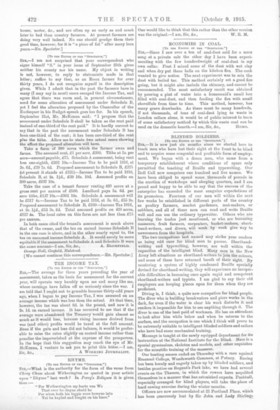Pro THE EDITOR OF TUB SPEOTATOR."] am not surprised that
your correspondent who signs himself "S." in your issue of September 25th gives neither his county nor his name. My object in writing is not, however, to reply to statements made in that letter; suffice to say that, as an Essex farmer for over thirty years, I do not recognize myself in the description given. While I admit that in the past the farmers have in many (I may say in most) cases escaped the Income Tax, and agree that there was room and, in present circumstances, need for some alteration of assessment under Schedule B, yet I feel the alteration proposed by the Chancellor of the Exchequer in his Budget speech goes too far. In his speech, September 21st, Mr. McKenna said "I propose that the assessment under Schedule B shall be taken as the rent paid instead of one-third of the rent paid." It is hardly correct to say that in the past the assessment under Schedule B has been one-third of the rent; it has been one-third of the rent jilts the tithe. Allow me to state two actual cases showing the effect the proposed alteration will have.
Take a farm of 300 acres which the farmer owns and farms. The assessed rent, 21 per acre, 2300. Tithe at 5s. per acre—amount payable, 275. Schedule A assessment, being rent less one-eighth, £262 10s.—Income Tax to be paid 1916, at 3s. 6d., 239 7s. 6d. Proposed assessment to Schedule B, £375 (at present it stands at 2125)—Income Tax to be paid 1916, Schedule B, at 2s. lid., 239 16s, 10d. Assumed profits on 300 acres, 2637 10s.
Take the case of a tenant farmer renting 420 acres at a gross rent per annum of 2500. Landlord pays 5s. 6d. per acre tithe, £137 10s.-2362 10s. Schedule A assessment will be 2317 4s.—Income Tax to be paid 1916, at 3s. 6d., 255 9s. Proposed assessment to Schedule B, 2500—Income Tax 1916, at 2s. lids 253 3s. 6d. Total assumed profits on 420 acres, 2817 4s. The local rates on this farm are not less than £75 per annum.
In both cases cited the tenant's assessment is much above that of the owner, and the tax on earned income Schedule B in the one case is above, and in the other nearly equal to, the tax on unearned income Schedule A. It would surely be more equitable if the assessment to Schedule A and Schedule B were the same amount—I am, Sir, &c., A. BLO1IFIELD. Orange Hail, Goafteld, Halstead.
[We cannot continue this correspondence.—ED. Spectator.] •


































 Previous page
Previous page